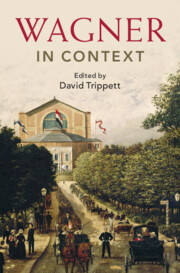Book contents
- Wagner in Context
- Composers in Context
- Wagner in Context
- Copyright page
- Contents
- Illustrations
- Musical Examples
- Contributors
- Acknowledgements
- Abbreviations
- Introduction
- I Place
- II People
- III Politics, Ideas, and Bodies
- Chapter 15 National Politics
- Chapter 16 Revolutionary Politics
- Chapter 17 World-Drama: Wagner’s Hegelian Heritage
- Chapter 18 Towards an ‘Ideal’ Feminine
- Chapter 19 Health and Wellness
- Chapter 20 Sexuality and Social Mores
- Chapter 21 Sentient Bodies
- Chapter 22 Racial Theory
- IV Life, Language, and the Ancient World
- V Music and Performance
- VI Reception
- Further Reading
- Select Bibliography
- Index
Chapter 21 - Sentient Bodies
from III - Politics, Ideas, and Bodies
Published online by Cambridge University Press: 14 March 2024
- Wagner in Context
- Composers in Context
- Wagner in Context
- Copyright page
- Contents
- Illustrations
- Musical Examples
- Contributors
- Acknowledgements
- Abbreviations
- Introduction
- I Place
- II People
- III Politics, Ideas, and Bodies
- Chapter 15 National Politics
- Chapter 16 Revolutionary Politics
- Chapter 17 World-Drama: Wagner’s Hegelian Heritage
- Chapter 18 Towards an ‘Ideal’ Feminine
- Chapter 19 Health and Wellness
- Chapter 20 Sexuality and Social Mores
- Chapter 21 Sentient Bodies
- Chapter 22 Racial Theory
- IV Life, Language, and the Ancient World
- V Music and Performance
- VI Reception
- Further Reading
- Select Bibliography
- Index
Summary
The reception of Wagner’s music as physically affecting, sound that manipulates the bodies of listeners, took place within a context of research into human and animal physiology. From reflex mechanisms to sense energies, the physiological response to art brought about new understandings of ‘physiological aesthetics’ in figures from Herbert Spencer to Thomas Huxley and Francis Galton, with a corresponding ‘physiological music theory’ applied by Ernst Mach and Hermann von Helmholtz. This led to various efforts at quantification of ear acuity and the role of the auditory nerve.
In the shadow of decadence, critical evaluation of works like Tristan and Tannhäuser traverse the spectrum from appreciation (‘bliss of the spinal cord’) to anxiousness (‘Wagner increases exhaustion’). Against these claims, Wagner’s numerous writings on sentience (Sinnlichkeit), rooted in Ludwig Feuerbach’s philosophy of perceptual realism, were directed towards topics as diverse as a theory of performance, the role of critics, and animal testing.
Keywords
Information
- Type
- Chapter
- Information
- Wagner in Context , pp. 205 - 216Publisher: Cambridge University PressPrint publication year: 2024
